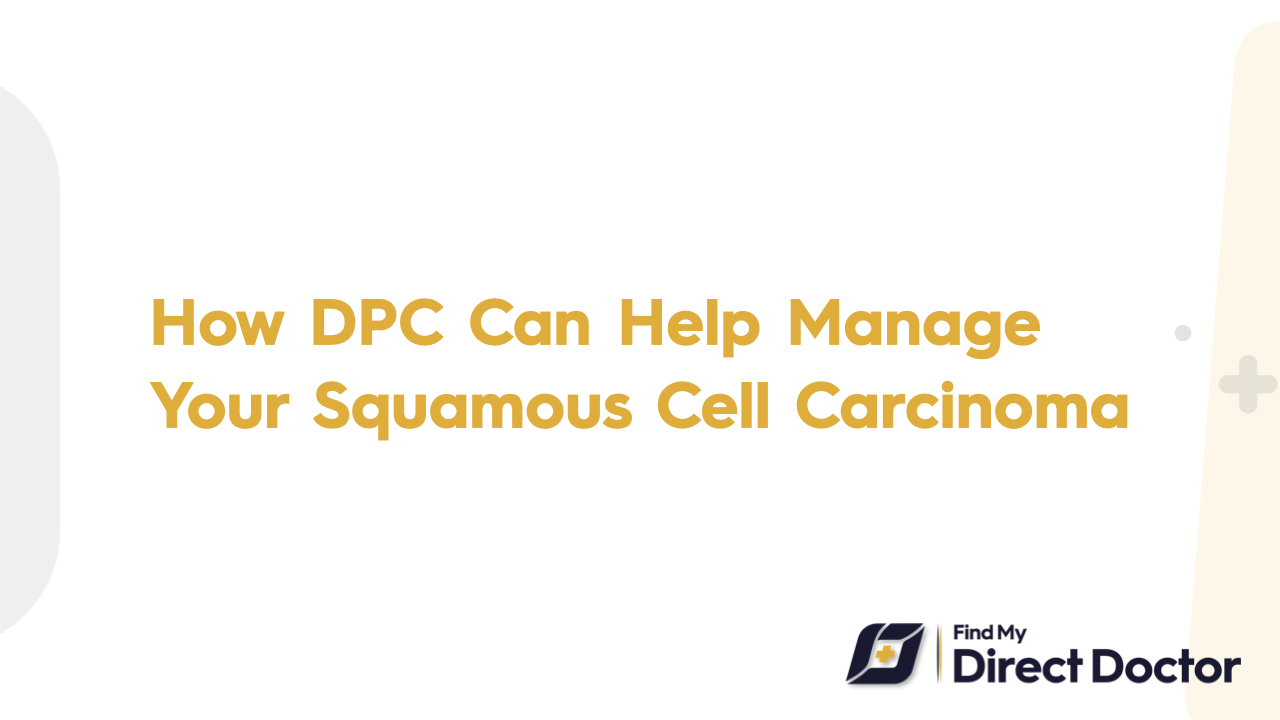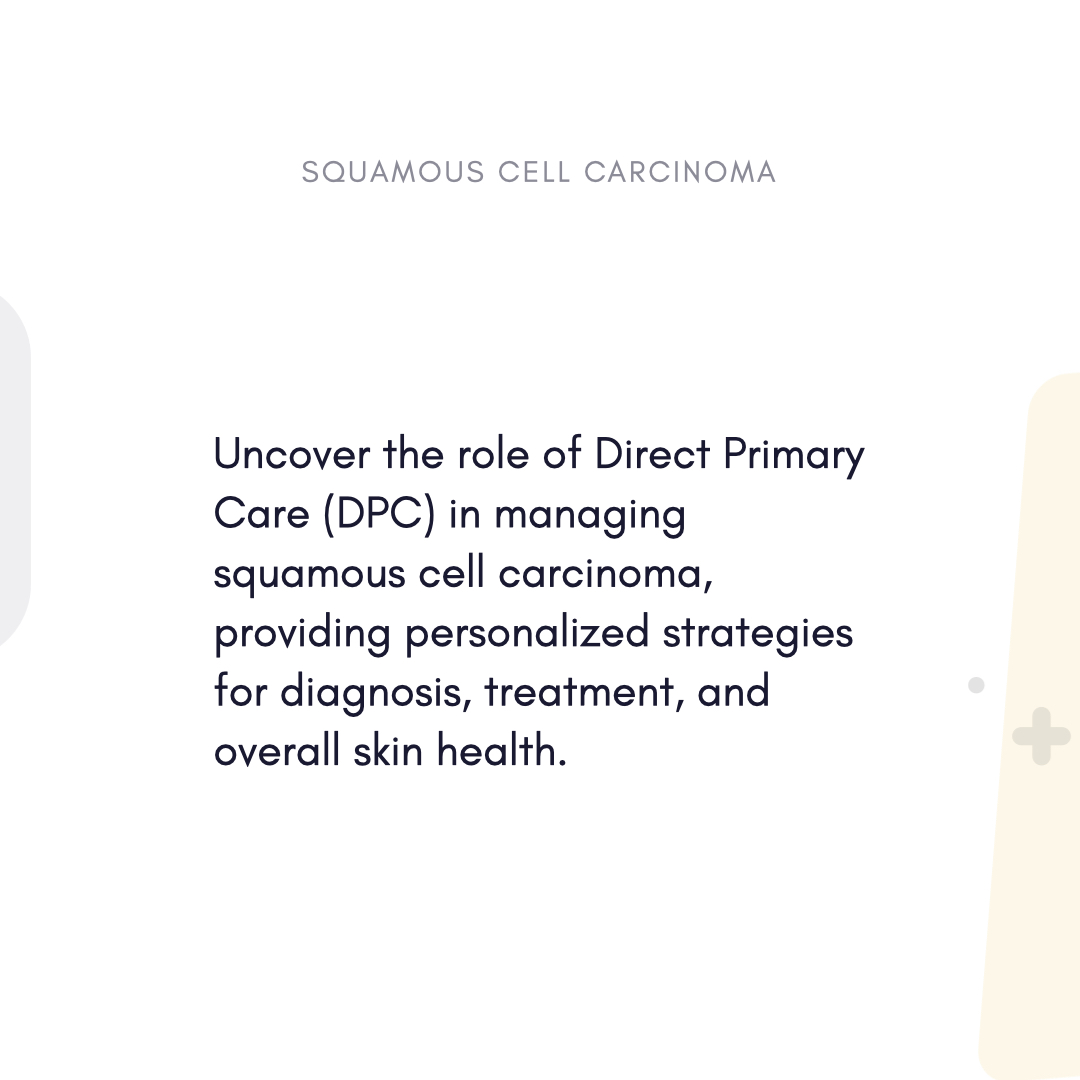Squamous Cell Carcinoma and Direct Primary Care (DPC): Proactive Care for Skin Cancer Survival
You know how urgently you should treat squamous cell carcinoma (SCC) if you have ever seen a scaly, crusted patch on your skin that won't heal or a fast growing nodule that bleeds readily. Affecting more than one million Americans yearly, SCC is the second most often occurring skin cancer. Although treated SCC can invade deeper tissues, spread to lymph nodes, and turn fatal, it is hardly fatal overall. Direct Primary Care (DPC), which combines fast diagnostics, cost transparency, and care catered to your particular risks, presents a vigilant, patient-centered approach to SCC management, however.

Understanding Squamous Cell Carcinoma and Its Risks
Usually brought on by keratinocytes in the top layers of the skin, SCC results from:
- UV exposure: Use of a tanning bed or cumulative sun damage.
- Organ transplant recipients or those living with HIV are under immunosuppression.
- Inflammation on a chronic basis: burns, scars, HPV infections.
Warning indicators:
- Rough, scaly reddish patches
- Open sores either bleeding or crusting.
- Growing raised objects with central depression
- Fast expansion over several weeks
Long-term hazards of uncontrolled SCC:
- Local tissue destruction—that of the nose, ears, etc.
- Metastasize to organs or lymph nodes
- Recurrence rates up to 50% in two years.
DPC Changes Everything SCC Treatments
Under the membership model known as Direct Primary Care (DPC), patients pay a monthly fee—usually 50 USD–150 USD—for unlimited access to their main care physician. This translates for SCC patients into no surprise bills, no delays in biopsies, and early detection and prevention-oriented treatment.
Here's why DPC distinguishes itself:
1. Quick, Guideline-Driven Detection
DPC doctors adhere to American Academy of Dermatology guidelines including:
- Exams of the whole body: quarterly evaluations for patients at high risk (fair complexion, transplant candidates).
- In-office biopsies: Same-day local anesthesia sampling of suspicious lesions.
- Working with labs for results in 48–72 hours instead of weeks speeds pathology coordination.
2. Reasonably priced, open treatment
- DPC clinics cut expenses by: providing wholesale-priced topical treatments like 5-fluorouracil cream.
- Avoiding specialist fees, doing curettage or cryotherapy in-office.
- Bargaining for Mohs surgery (800 USD–1,500 USD against typically 3,000 USD+).
3. Prevention via Constant Surveillance
- Review new or changing lesions via safe photo uploads using 24/7 access to your DPC doctor.
- Change your approach to sun protection—that is, move to mineral sunscreens.
- Consult mental health resources to control scanxiety following a diagnosis.
DPC Benefits for SCC Patients
Customized Prevention Strategies
- Each visit, DPC doctors spend 30 to 60 minutes developing plans including:
- Risk-based screening: XP gene mutation genetic testing for families having several SCCs.
- Lifestyle coaching: smoking cessation, vitamin D optimization, UV-protective clothes.
- Nicotinamide supplements (shown to lower SCC recurrence by 30%) help immunity.
Financial Restraints
- No co-pays for lesion evaluations classified as urgent.
- In conventional settings, biopsies between 100 USD and 200 USD compare to 500 USD+.
- Preventive care helps avoid ER visits for infected lesions.
Perfect Expert Coordination
Should advanced treatment be required, DPC doctors:
- Quick referrals to oncologists or dermatologic surgeons.
- Share your background to avoid unnecessary tests—that is, duplicated imaging.
- Track for recurrence by means of routine follow-ups.
Personal Success Stories from Real Life
- Case 1: Recipient of a transplant, Linda, 68, developed a recurrent SCC on her scalp. Her DPC doctor coordinated low-cost Mohs surgery and prescribed topical imiquimod to stop spread.
- Case 2: Mark, 45, skipped biopsies for financial reasons. Early SCC discovered in his DPC clinic by dermoscopy was treated in-office with cryotherapy for less than 150 USD.
FAQs on DPC and Squamous Cell Carcinoma
- Q: Can DPC treat metastatic SCC?
- A: While DPC oversees first treatment, advanced cases call for oncology teams. DPC doctors advocate for reasonably priced immunotherapy or radiation and streamline referrals.
- Q: For high-risk patients needing regular visits, is DPC reasonably priced?
- A: Perfectly true. Against conventional models, members save 40–60% yearly on tests, biopsies, and preventives.
- Q: Should I be seeing a dermatologist?
- A: A DPC provider schedules same-week visits and typically works out discounts for specialist visits based on self-pay.
Why DPC Will Help SCC Patients Win?
Early detection is stressed by the Skin Cancer Foundation as essential to stop SCC development. DPC stands out for:
- Early diagnosis of lesions: 95% of SCCs respond well with quick treatment.
- Education on self-exams applying the ABCDE rule will empower patients.
- Simplifying the treatment: One fixed monthly cost covers unlimited visits, pictures, and follow-ups.
Use DPC to Future-Protect Your Skin
Squamous cell carcinoma does not have to cause financial or emotional stress. Every spot, every scan, every step counts—your vigilance, your budget, and your peace of mind are priorities for your partner with DPC.






